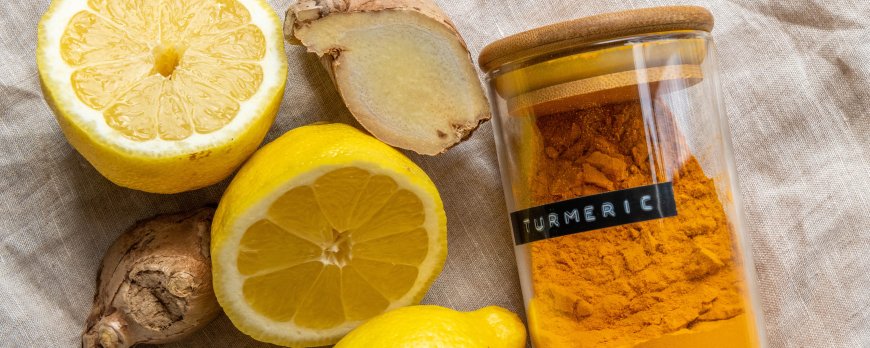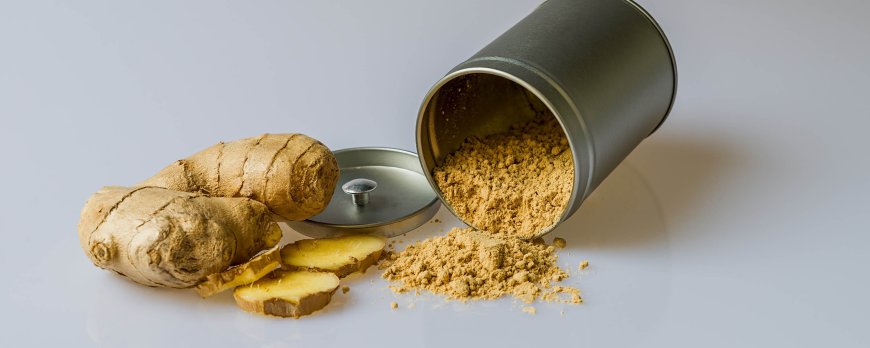Are turmeric pills good for you?
Explore the key benefits and potential risks as we delve into the question, 'Are turmeric pills good for you?' Discover the power of this ancient spice.

What are Turmeric and Curcumin?
Turmeric is a yellow spice commonly used in Indian cuisine, and it contains a compound called curcumin, which has been shown to have anti-inflammatory properties. Curcumin is the active ingredient in turmeric that is believed to provide potential health benefits. It has been the subject of numerous studies due to its potential in managing inflammation and joint pain.
Curcumin is known for its antioxidant properties, which help protect the body against free radicals and oxidative stress. These properties, coupled with its anti-inflammatory effects, make curcumin a popular natural remedy for various health conditions. However, it's important to note that the curcumin content in turmeric is relatively low, and the body has difficulty absorbing it. This is why many studies utilize turmeric extracts that are standardized to contain higher amounts of curcumin.
To enhance curcumin absorption, it is recommended to consume it alongside black pepper or a high-fat meal. Black pepper contains piperine, a compound that has been shown to improve curcumin absorption by up to 2,000%. Additionally, consuming curcumin with fat can also enhance its absorption, as curcumin is fat-soluble. It is important to note that the appropriate dosage of turmeric supplements may vary and should be discussed with a healthcare professional.
In summary, turmeric and its active compound, curcumin, have shown potential in managing inflammation, reducing joint pain, improving heart health, preventing certain types of cancer, and possibly even treating Alzheimer's disease. However, more research is needed, particularly in human studies, to confirm these effects. While turmeric supplements are generally considered safe for most people, it is important to consult a healthcare professional before starting any supplementation, especially if there are existing health conditions or medications being taken. Additionally, it is recommended to incorporate turmeric into the diet through cooking and natural sources rather than relying solely on supplements.

The Benefits of Curcumin
Curcumin, the active compound in turmeric, has been studied for its numerous health benefits, particularly its anti-inflammatory properties and potential to alleviate joint pain. Here are some potential benefits of curcumin:
- Anti-inflammatory effects: Curcumin has been found to have strong anti-inflammatory properties, which may help reduce inflammation in the body. This can be beneficial for people suffering from chronic inflammation, such as those with arthritis or inflammatory bowel disease.
- Antioxidant activity: Curcumin is a powerful antioxidant that helps protect the body from free radicals, which are unstable molecules that can damage cells and contribute to various diseases.
- Potential cancer prevention: Some studies have suggested that curcumin may have anticancer properties, as it can inhibit the growth and spread of cancer cells. However, more research is needed to fully understand its effects on different types of cancer in humans.
- Heart health support: Curcumin may promote heart health by reducing inflammation and oxidative stress, two factors that contribute to the development of heart disease. It may also help improve cholesterol levels and blood vessel function.
To fully experience the benefits of curcumin, it's important to ensure optimal absorption. Curcumin is not easily absorbed by the body, which is why turmeric extracts standardized to contain higher amounts of curcumin are often used in studies. Additionally, consuming curcumin with black pepper or a high-fat meal can enhance its absorption. This is because black pepper contains a compound called piperine, which increases the bioavailability of curcumin, while fat helps dissolve curcumin and aids in absorption.
While turmeric supplements can be a convenient way to incorporate curcumin into your routine, it's important to note that they may not provide significant benefits on their own. It is recommended to include turmeric in your diet through cooking, as this allows for a more varied intake of beneficial compounds found in turmeric. However, if you decide to take turmeric supplements, it's always best to consult with a healthcare professional, especially if you are on any medications or have specific health conditions.

Enhancing Curcumin Absorption
To maximize the absorption of curcumin from turmeric pills, it is recommended to consume them with black pepper or a high-fat meal. Black pepper contains a compound called piperine, which has been shown to enhance the bioavailability of curcumin in the body. This means that combining turmeric with black pepper can improve the absorption and effectiveness of curcumin, potentially increasing its health benefits. Additionally, consuming turmeric pills with a high-fat meal can help improve absorption, as curcumin is fat-soluble.
How to enhance curcumin absorption:
- Add a pinch of black pepper to your turmeric pills or consume them together
- Include a source of healthy fat, such as olive oil or avocado, with your turmeric pills
- Consider cooking with turmeric powder or adding it to your meals for a more natural and balanced way to incorporate curcumin into your diet
It is important to note that curcumin absorption varies from person to person. If you are considering turmeric supplementation for specific health concerns, it is recommended to consult with a healthcare professional, who can provide personalized recommendations and dosage instructions based on your individual needs.
While turmeric pills can be a convenient way to consume curcumin, they may not provide the same benefits as consuming turmeric through food sources. Turmeric is a versatile spice that can be easily incorporated into various dishes, such as curries, soups, and stir-fries. By enjoying turmeric-spiced meals regularly, you can not only enhance curcumin absorption but also benefit from other compounds and nutrients present in the whole spice.
Turmeric for Inflammation
Research suggests that turmeric and its active compound, curcumin, may have anti-inflammatory effects that can help reduce chronic inflammation in the body. Inflammation is a natural response of the immune system to injury or infection, but when it becomes chronic, it can contribute to various health conditions such as arthritis, heart disease, and certain types of cancer.
Curcumin, found in turmeric, has been shown to inhibit the production of inflammatory markers and enzymes in the body. It may also help regulate the activity of immune cells involved in the inflammatory process. By reducing inflammation, turmeric and curcumin have the potential to alleviate symptoms associated with inflammatory conditions, such as joint pain, swelling, and stiffness.
It is important to note that while studies have demonstrated the anti-inflammatory properties of turmeric and curcumin, more research is needed to confirm these effects and determine the optimal dosage and duration of use. Additionally, it is advisable to consult a healthcare professional before incorporating turmeric supplements into your routine, especially if you are currently on any medications or have underlying health conditions.
Ways to incorporate turmeric for inflammation:
- Add turmeric powder to your meals: Sprinkle turmeric on roasted vegetables, stir it into soups or sauces, or use it to season poultry or fish.
- Create a turmeric tea or golden milk: Boil water or milk with turmeric, ginger, and other spices for a soothing and flavorful beverage.
- Try turmeric supplements: If you opt for supplements, look for those that are standardized to contain a higher percentage of curcumin for maximum potential benefits.
In conclusion, turmeric and its active compound, curcumin, show promise in reducing chronic inflammation in the body. Incorporating turmeric into your diet through cooking or considering turmeric supplements may provide some anti-inflammatory benefits. However, it is important to remember that more research is needed in human studies to fully understand the potential effects and determine the optimal usage of turmeric for inflammation.

Turmeric for Heart Health
Turmeric's anti-inflammatory properties may play a role in promoting heart health by reducing inflammation, a key factor in cardiovascular diseases. Curcumin, the active compound in turmeric, has been shown to have antioxidant and anti-inflammatory effects that could potentially benefit the heart.
Turmeric's potential benefits for heart health include:
- Reducing inflammation in the arteries, which can help prevent the buildup of plaque and lower the risk of heart disease.
- Improving the function of blood vessels, which can enhance blood flow and reduce the risk of high blood pressure.
- Protecting against oxidative stress, which can damage cells and contribute to heart disease.
- Potentially reducing the risk of blood clot formation, a common cause of heart attacks and strokes.
While these potential benefits are promising, it's important to note that more research is needed to fully understand the effects of turmeric on heart health. Most studies have been conducted in animals or test tubes, and few have been done on humans. Additionally, the curcumin content in turmeric is relatively low, and the body has difficulty absorbing it. To enhance absorption, it is recommended to consume curcumin with black pepper or a high-fat meal.
If you're considering incorporating turmeric into your routine for its potential heart health benefits, it's essential to consult with your doctor. They can provide personalized advice based on your individual health needs and medications. Remember, turmeric pills alone may not provide significant benefits, and it is recommended to incorporate turmeric into your diet through cooking rather than relying solely on supplements.
Turmeric and Cancer Prevention
Preliminary studies have shown that turmeric and curcumin may exhibit anticancer effects, potentially preventing the development and progression of certain types of cancer. Turmeric pills contain curcumin, an active ingredient known for its various health benefits, including its potential role in cancer prevention.
Turmeric and curcumin have been found to possess anti-inflammatory and antioxidant properties, which are believed to contribute to their potential anticancer effects. These properties help combat oxidative stress, which can cause DNA damage and lead to the formation of cancer cells.
Additionally, curcumin has been shown to interfere with several signaling pathways involved in cell growth and proliferation, as well as angiogenesis, the formation of new blood vessels that tumors rely on to grow and spread. By targeting these pathways, curcumin may inhibit the development and progression of cancer.
While the results of these studies are promising, it is essential to note that most of the research has been conducted in laboratory settings or on animals. More studies are needed to validate these findings and determine the optimal dosage and delivery method of turmeric and curcumin for cancer prevention in humans.
Note: Turmeric supplements should not be used as a substitute for conventional cancer treatments. Always consult with a healthcare professional for guidance on cancer prevention and treatment strategies.

Turmeric for Alzheimer's Disease
Some studies have suggested that turmeric and curcumin may offer protective effects against Alzheimer's disease, a progressive neurodegenerative disorder. The active compound in turmeric, curcumin, has been found to possess antioxidant and anti-inflammatory properties, which may help reduce the buildup of amyloid plaques in the brain and prevent oxidative damage, both of which are implicated in the development of Alzheimer's disease.
While the research in this area is still emerging, preliminary studies have shown promising results. In one study, researchers found that curcumin supplements improved memory and attention in individuals with mild cognitive impairment, which is often considered a precursor to Alzheimer's disease. Another study found that curcumin supplementation led to a decrease in beta-amyloid plaques, a hallmark feature of Alzheimer's disease, in the brains of mice.
It is important to note that more research is needed to fully understand the potential benefits of turmeric and curcumin in preventing and treating Alzheimer's disease. The studies conducted so far have predominantly been carried out in animals or in small human populations, making it crucial to confirm these effects in larger, controlled clinical trials.
Incorporating turmeric into your diet through cooking can be a simple and enjoyable way to consume this spice. However, it is important to remember that turmeric on its own may not provide significant amounts of curcumin, so supplementation with standardized turmeric extracts may be necessary to achieve therapeutic levels of curcumin. As always, it is advisable to consult with your healthcare provider before starting any new supplement regimen, especially if you have a medical condition or are taking medications.
Safety of Turmeric Pills
While turmeric pills are generally considered safe for most people, it is essential to consult with a healthcare professional, particularly if you are taking other medications or have underlying health conditions. Turmeric supplements contain the active ingredient curcumin, which has been found to have potential health benefits. However, it is important to understand the appropriate dosage and potential side effects before incorporating turmeric pills into your routine.
Possible side effects
Some individuals may experience gastrointestinal issues such as stomach upset, bloating, or diarrhea when taking turmeric pills. It is also important to note that turmeric may have a blood-thinning effect, so caution should be exercised if you are taking antiplatelet or anticoagulant medications. If you have liver or bile duct problems, it is advisable to consult with a healthcare professional before starting any supplementation.
Consult with a healthcare professional
To ensure the safe and proper use of turmeric supplements, it is recommended that you consult with a healthcare professional. They can assess your individual health situation, consider any potential drug interactions, and provide guidance on the appropriate dosage. Your healthcare professional can also help determine if incorporating turmeric into your diet through cooking rather than relying solely on supplements may be a more beneficial approach.
By seeking professional guidance, you can make informed decisions about incorporating turmeric pills into your health regimen and maximize the potential benefits while minimizing the risk of side effects.

A Holistic Approach to Turmeric
While turmeric pills can provide some benefits, a more holistic approach to incorporating turmeric into your diet through cooking and natural sources may offer additional advantages. Turmeric is a versatile spice that has been used in traditional medicine for centuries. Adding it to your meals not only enhances the flavor but also allows you to benefit from its potential health-promoting properties.
One way to incorporate turmeric into your diet is by using it as a spice in various recipes. You can sprinkle it on roasted vegetables, add it to soups and stews, or mix it into dressings and marinades. This way, you can enjoy the natural flavors and nutrients of turmeric while adding depth and richness to your dishes. Experimenting with different recipes can help you discover new and exciting ways to incorporate this vibrant spice into your meals.
In addition to using turmeric as a spice, you can also explore other natural sources, such as turmeric tea or golden milk. These beverages offer a comforting and soothing way to consume turmeric while providing potential health benefits. Turmeric tea can be made by steeping grated or powdered turmeric in hot water, while golden milk combines turmeric with warm milk and other spices like ginger and cinnamon.
By embracing a holistic approach to turmeric, you can maximize its potential benefits while enjoying a varied and nutritious diet. While supplements can be convenient, they may not offer the same synergistic effects as whole foods. So, next time you're in the kitchen, consider reaching for turmeric and exploring the countless possibilities it has to offer.
Conclusion
Turmeric pills may offer potential health benefits, particularly in reducing inflammation and improving certain health conditions, but it is crucial to approach their use with caution and seek professional advice. Turmeric contains curcumin, an active ingredient that has been found to have anti-inflammatory and antioxidant properties. However, the curcumin content in turmeric is relatively low, and the body has difficulty absorbing it. To enhance absorption, it is recommended to consume curcumin with black pepper or a high-fat meal.
While turmeric and curcumin have shown promising effects in reducing inflammation, improving heart health, preventing cancer, and possibly treating Alzheimer's disease, more research is needed to confirm these benefits, especially in humans. Studies often use turmeric extracts with higher curcumin content for better results.
Turmeric supplements are generally considered safe for most people, but it is important to consult a doctor before starting any new supplement regimen, especially if you are taking anticoagulants or have liver or bile duct problems. It is also worth noting that turmeric pills alone may not provide significant benefits. Incorporating turmeric into your diet through cooking is recommended, as it allows for a balanced and varied approach to obtaining the potential health benefits of turmeric.
FAQ
What are Turmeric and Curcumin?
Turmeric is a yellow spice commonly used in cooking, while curcumin is the active ingredient found in turmeric. Curcumin has been found to have anti-inflammatory, antioxidant, and potential anticancer properties.
What are the benefits of curcumin?
Curcumin has shown potential benefits in reducing inflammation, improving heart health, preventing cancer, and possibly even treating Alzheimer's disease. However, more research is needed to confirm these effects, especially in humans.
How can curcumin absorption be enhanced?
Curcumin absorption can be enhanced by consuming it with black pepper or a high-fat meal. This helps the body absorb the curcumin more effectively.
Can turmeric help with inflammation?
Yes, turmeric and curcumin have shown potential benefits in reducing inflammation and managing chronic inflammation-related conditions.
Can turmeric improve heart health?
Turmeric's anti-inflammatory properties may contribute to improved cardiovascular health, but more research is needed to fully understand its effects.
Can turmeric and curcumin prevent cancer?
Studies suggest that turmeric and curcumin may possess anticancer properties, but more research is needed to confirm their preventive effects.
Can turmeric and curcumin treat Alzheimer's disease?
Some studies suggest that turmeric and curcumin may have neuroprotective properties and could potentially be used in the prevention and treatment of Alzheimer's disease. However, more research is needed to fully understand their effects.
Are turmeric pills safe to take?
Turmeric pills are generally safe for most people. However, it is important to consult a doctor before taking them, especially if you are on anticoagulants or have liver or bile duct problems.
Should I rely solely on turmeric pills for health benefits?
It is recommended to incorporate turmeric into your diet through cooking rather than relying solely on supplements. A balanced and varied diet is important for overall health.


































































































































